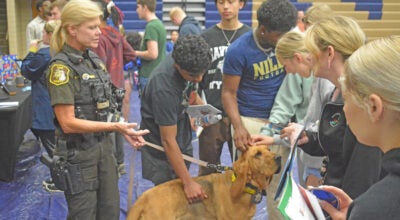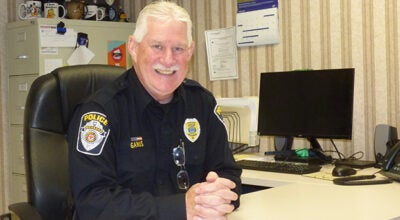Bridges out of poverty
Published 10:37 am Friday, March 5, 2010

Dona Billey-Weiler of COA and Ruth Andrews of HSCC in Dowagiac March 4. (The Daily News/John Eby)
By JOHN EBY
Dowagiac Daily News
Dowagiac Rotary Club heard Thursday noon about the nationally-acclaimed Bridges Out of Poverty training Friday, April 30, from 10 a.m. to 4 p.m. at Cass County Council on Aging east of Cassopolis and the poverty simulation workshop Wednesday, March 17, at the Van Buren Intermediate School District Conference Center in Lawrence from Ruth Andrews, who staffs the Human Services Coordinating Council (HSCC) and Dona Billey-Weiler, COA director of education and life enrichment.
Cassopolis graduate Bonnie Bazata, St. Joseph County, Ind., Bridges Out of Poverty executive director for three years, will provide Day One training, which is mandatory for anyone wishing to become a facilitator. She can accommodate up to 80 people to impart the general overview and philosophy.
Facilitators will be trained a month after that.
Billey-Weiler and Adrienne Glover, COA assistant executive director, will lead the first group of up to 15 starting in July. Bazata made a presentation to the HSCC January meeting.
Cost of the training is $25 for Cass HSCC member agencies and includes lunch and books. The cost is $40 for non-members who belong to the National Association of Social Workers (NASW) and $60 for all others. Payment will be accepted at the event.
To register, e-mail Andrews at andrews3@michigan.gov. Please include your agency affiliation and phone number.
The HSCC is more than 30 agencies which meet together each month.
“We work on big problems, such as poverty, at the county level that are too big for any one agency. Poverty is something we’ve been working on a for a while. About four years ago we decided to tackle it through our earned-income tax program. We created a free tax preparation program which has been ongoing since then,” Andrews said at Elks Lodge 889.
“Poverty is still increasing, and I know that’s something we’re all concerned about.
Michigan held a poverty summit two years ago and we now have a statewide reduction initiative. One year ago, for our region, we had folks come and present a PowerPoint,” from which she pulled these Cass County statistics:
• 16 percent of all families with children live in poverty.
• 13 percent of all white families and 41 percent of all black families live in poverty. “I find that really shocking,” Andrews said. “I did not know that over three times as many black families as white families are in poverty. That’s definitely something we need to address.”
• African-American poverty increased from 23 percent to 32 percent between 2005 and 2007.
• 58 percent of all African-American children live in poverty in Cass County. “That’s very unacceptable,” Andrews said. “Another concerning statistic is that 32 percent of all new mothers are poor. The reason that concerns us so much is that 80 percent of brain development occurs in the first three years. When you’re in poverty, the stress level is high and negatively impacts the way your brain develops. We limit their future and our future, but what can we do about a great big thing like poverty?”
Regional leadership recommended the free March 17 poverty simulation workshop.
Participants experience one month of poverty compressed into three hours, from 1 to 4 p.m. at 155 N. Paw Paw St. in Lawrence.
Contact Kelcie Douglas, event coordinator for the Poverty Reduction Initiative, with questions at (269) 615-1383 or povertysimulation@haltpoverty.org.
The Rev. Rick Swanson, rector at St. Paul’s Episcopal Church, once led such a simulation for teen-agers. “It really opened eyes, not just the outside look at what poverty might be like, but how hard it is to actually live.”
“The first time I did a poverty simulation, I was surprised by how quickly I was ready to break the law to survive,” Andrews admitted. “If Bridges is going to succeed in Cass County – and it is designed to get people out of poverty – it takes community transformation. We need everybody. Bonnie emphasizes that wealthy people and middle-class people need to interact with people in poverty because we all know that if you just associate with the people you’ve always associated with, you’re not going to go anywhere. I appeal to all of you to get involved however you can. Bankers would be great partners. We want everyone to become ‘banked.’ So many people living in poverty don’t use banks, which costs them more.”
Billey-Weiler said, “Until we are face to face with the poor and understand their world, we can’t know what it’s like to live like they do. A nice analogy is old people, and I say that respectfully. Elementary children say to me the oldest person they know is 35, 47 or 53. That’s their world. Until and unless you’ve been around old people, you can’t appreciate the prejudices and stereotypes. It’s the same with the poor.
“We are recruiting 15 people in Cass County for 15 weeks (July to October) to come alongside us in this program to help facilitate them understanding the language and culture of poverty and the middle class. There will be opportunities to network with the poorest of the poor in Cass County. They need your input, your mentoring and your encouragement. We need to be with them.”
Billey-Weiler told of a waitress at a “Gold Coast Chicago” restaurant, making hundreds of dollars a night in tips. But the “drug culture attracted her because poverty was all she knew, so she left her job. Generational poverty is different from situational poverty. Any of us who have a house and lose a job could have situational poverty in an instant. There are thousands of those across the country right now. It usually takes someone in generational poverty three generations to get out of it. If you haven’t been taught and mentored or had a role model in your home, you do what you know. There’s a lot of statistical research for how people in generational poverty handle cash, what they do for entertainment, how they know where the best Dumpsters are for diving, know who to call on to fix their junk car for a way to get to work.”
The waitress “went right back into generational poverty because she didn’t have the mentoring and help she needed in her life to give her enough of a strong influence. Strong families make strong communities,” Billey-Weiler said. “I’m happy to say today she’s a graduate of the Getting Ahead program. She’s almost finished with her degree at Ivy Tech in South Bend. She’s picked herself up out of poverty and has a wonderful support system in the South Bend area.”
Dr. Ruby Payne, who has led thousands of Bridges Out of Poverty workshops in the past two decades, graduated from Goshen College, earned her master’s degree from Western Michigan University and completed her doctorate through Loyola University in Chicago.
Her 1995 book, “Foundations of Poverty,” led to “Bridges Out of Poverty,” the curriculum that will be used at the COA, which also uses it to teach intergenerational etiquette.
“Ruby Payne’s argument,” Dona said, “is that the way we’ve been addressing poverty up until now has very little to do with the people who are actually the ones we want to impact. She argues there are standards when you talk about poverty … Poverty is relative. It occurs in all races and across all countries. The poverty line changes every year.
Generational poverty and situational poverty are very different. There are hidden rules in every class. The middle class has hidden rules. We talk a language that we understand with innuendo and anecdotes in a way that people in poverty don’t get. They have their own language and hidden rules that are very different from the middle class. We prohibit them from crossing that barrier sometimes by the way we behave toward them and look down and make judgments. We have a lot of misunderstandings about who they are and why they’re there in the first place. The program wants to address that and very basic issues of self-esteem. It doesn’t let them off lightly. It helps them be responsible and accountable for where they are. It doesn’t sugar-coat the situation. They have to work hard, and they learn how to do that on a heart-to-heart level. You can’t scold them for not knowing. If a little girl grows up without a mother to teach her how to clean her house, she doesn’t know how to clean her house. A little boy, for that matter.
“This program provides support, insistence and expectations for ways to move yourself from poverty to the middle class. Sometimes I say to my boss, Bob Cochrane, that everything isn’t always about quantitative data – how many people were served. You can’t always know when someone has a transformation in their heart. Trips abroad can open eyes to different cultures and different ways of life. Bridges is an invitation for Cass County to open their eyes and their hearts again to the many among us who, because of poor choices, genuine lack of opportunity and careless mistakes, are on the wrong road.”
Part of the COA mission is to “make longer lives better lives.”
“We say we are accountable to the next generation,” Billey-Weiler said. “Join us as we begin this new process.”
Cass District Library Director Jennifer Ray pinch-hit for Bob Wagel in introducing the program.
“I so respect today’s speakers, who put their hearts and souls into work that enriches and improves the lives of people in our community.”






